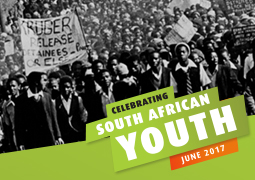
It is important to pay tribute to the martyrs who marched against the decree that sought to elevate Afrikaans as a medium of instruction in black schools – out of which emerged the largest outbreak of violence South Africa has ever experienced, said the Deputy Minister of Higher Education, Mr Mduduzi Manana, during the National Assembly’s Youth Day debate under the theme “Advancing Youth Economic Empowerment”.
“Their rejection of Bantu Education has made them to claim their rightful place in history. Forty-one years later, we have to consolidate the gains of their goals to rid the youth of poverty, unemployment and inequality. To realise this we have to re-engineer our education policy and come up with a new trajectory that is an expression of the future we aspire for our youth,” he said.
The current youth unemployment rate is a ticking bomb, he said. “Hence we have identified ‘Advancing Youth Economic Empowerment’ as a number one priority and a critical component to achieving our country’s economic priorities.”
We also have to deal with the wrong notion that post-schooling is only university education. We want to reverse it, he said.
“We want to reverse this anomaly of more youth who are going to university. We want to have more youth enrolling at technical colleges which offer a base to build critical skills base. Hence, we have declared 2014-2024 an artisan decade, in our quest to realise our country’s industrial capacity and to produce 30 000 artisans by 2030.”
Despite 23 years of freedom, the black child gets the worst education in the world, said Mr Yusuf Cassim. “The black child is likely to grow in poverty than a white child because he or she gets the worst education in the world.”
While colonialism and apartheid disempowered the black child, it is the current government that kept them ignorant. Youth economic empowerment is just an empty rhetoric, he said.
We pay tribute to the gallant efforts of those who championed the struggle for the decolonisation of our education, said Mr Moses Mbatha. “That generation put the interests of black youth at the heart of what was just and fair. They co-authored a political journey and conditions that created a fertile ground for our liberation. Our economic freedom will be incomplete without the attainment of our land,” he said.
“With recession, poverty and junk status that our youth are faced with it, it is difficult to speak of economic freedom,” said Mr Mkhuleko Hlengwa. He added:“It is also difficult to speak of economic development when Parliament has refused to have a Parliamentary Multi-Party Youth Caucus that will deal with youth issues.As long as this is not realised, youth issues will not be fairly dealt with,” he said.
Maybe we have to revisit our higher education curriculum to ensure that it is in line with the needs of our labour market, said Mr Sibusiso Mncwabe. “Many young people graduate with skills not relevant to our labour market, hence many of them are currently unemployed.”
It is hard not to draw parallels between June 16 and what the youth of today are faced with, said Mr Willie Madisha. “Our youth are still subjected to failing state schools that condemn them to the future of unemployment and dependency.”
The future of our youth is failing in front of our eyes. Graduates live in shameful poverty, said Mr Molapi Tlouamma. “Our young graduates are banished to a life of despair, they deserve a productive and fruitful future. We call on you not to lose hope. The government must recommit itself to working with the youth to advance their economic empowerment.”
By Abel Mputing
15 June 2017

